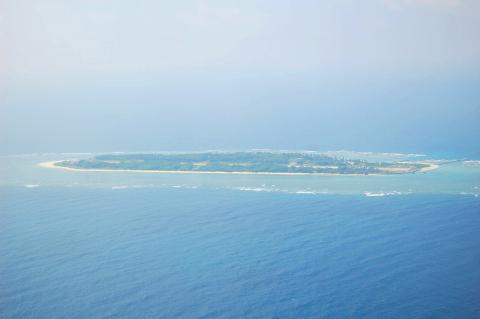Taiwan will launch oil exploration efforts in waters off Itu Aba Island (Taiping Island, 太平島) next year, in a move that is likely to raise tensions with other claimants to a series of islets in the South China Sea.
During a meeting at the legislature in Taipei yesterday, Bureau of Energy officials confirmed that the Ministry of Economic Affairs’ Bureau of Mines, in cooperation with CPC Corp, Taiwan (CPC, 台灣中油), would send ships to waters near Itu Aba to conduct exploration for potential oil resources next year.
Bureau of Energy Director-General Jerry Ou (歐嘉瑞) told the Foreign Affairs and National Defense Committee that a monthly budget of NT$17 million (US$583,670) would be allocated to fund the efforts.

Photo: CNA
Ou said that as Taiwan is almost entirely dependent on imports for its oil supply, it was imperative for the nation to diversify its energy sources.
Though unproven, the South China Sea is believed to contain important oil and gas resources. Taiwan, China, Vietnam, the Philippines, Malaysia and Brunei all lay claim to parts of the area.
Administered by Taiwan, Itu Aba is the largest islet in the disputed Spratly Islands (Nansha Islands, 南沙群島). It lies about 1,400km from Greater Kaohsiung.
In 2008, Taiwan finished constrcution of a 1,150m airstrip on the island. Earlier this year, the Coast Guard Administration — which is mandated with defending sovereignty over the island — augmented its equipment on Itu Aba with a supply of T63 120mm mortar systems and L/60 40mm anti-aircraft guns, sparking protests among other claimants, including Vietnam and the Philippines.
Asking for a progress report, Chinese Nationalist Party (KMT) Legislator Lin Yu-fang (林郁方), a strong supporter of Taiwan playing a more muscular role in the area, was assured that the plan had advanced past the “paperwork phase” and would be initiated as early as next month.
It has yet to be confirmed whether the exploration boats will be accompanied by coast guard vessels.
KMT Legislator Chen Cheng-hsiang (陳鎮湘) said the government should actively mine the waters near the Spratlys and the Pratas Islands (Dongsha Islands, 東沙群島) and establish a forward base in the area to oversee energy, fishing and environmental protection.
He also said a multilateral center should be established to lower the risks of sovereignty disputes with other countries.
On March 22, two coast guard speedboats were dispatched to intercept a pair of Vietnamese patrol vessels that had entered waters near Taiping, prompting the Ministry of Foreign Affairs to file a protest with Hanoi.
Two other ships entered waters near the island on March 26. The coast guard subsequently denied reports that shots had been fired during the incident.

‘WIN-WIN’: The Philippines, and central and eastern European countries are important potential drone cooperation partners, Minister of Foreign Affairs Lin Chia-lung said Minister of Foreign Affairs Lin Chia-lung (林佳龍) in an interview published yesterday confirmed that there are joint ventures between Taiwan and Poland in the drone industry. Lin made the remark in an exclusive interview with the Chinese-language Liberty Times (the Taipei Times’ sister paper). The government-backed Taiwan Excellence Drone International Business Opportunities Alliance and the Polish Chamber of Unmanned Systems on Wednesday last week signed a memorandum of understanding in Poland to develop a “non-China” supply chain for drones and work together on key technologies. Asked if Taiwan prioritized Poland among central and eastern European countries in drone collaboration, Lin

The Chien Feng IV (勁蜂, Mighty Hornet) loitering munition is on track to enter flight tests next month in connection with potential adoption by Taiwanese and US armed forces, a government source said yesterday. The kamikaze drone, which boasts a range of 1,000km, debuted at the Taipei Aerospace and Defense Technology Exhibition in September, the official said on condition of anonymity. The Chungshan Institute of Science and Technology and US-based Kratos Defense jointly developed the platform by leveraging the engine and airframe of the latter’s MQM-178 Firejet target drone, they said. The uncrewed aerial vehicle is designed to utilize an artificial intelligence computer

Renewed border fighting between Thailand and Cambodia showed no signs of abating yesterday, leaving hundreds of thousands of displaced people in both countries living in strained conditions as more flooded into temporary shelters. Reporters on the Thai side of the border heard sounds of outgoing, indirect fire yesterday. About 400,000 people have been evacuated from affected areas in Thailand and about 700 schools closed while fighting was ongoing in four border provinces, said Thai Rear Admiral Surasant Kongsiri, a spokesman for the military. Cambodia evacuated more than 127,000 villagers and closed hundreds of schools, the Thai Ministry of Defense said. Thailand’s military announced that

CABINET APPROVAL: People seeking assisted reproduction must be assessed to determine whether they would be adequate parents, the planned changes say Proposed amendments to the Assisted Reproduction Act (人工生殖法) advanced yesterday by the Executive Yuan would grant married lesbian couples and single women access to legal assisted reproductive services. The proposed revisions are “based on the fundamental principle of respecting women’s reproductive autonomy,” Cabinet spokesperson Michelle Lee (李慧芝) quoted Vice Premier Cheng Li-chiun (鄭麗君), who presided over a Cabinet meeting earlier yesterday, as saying at the briefing. The draft amendment would be submitted to the legislature for review. The Ministry of Health and Welfare, which proposed the amendments, said that experts on children’s rights, gender equality, law and medicine attended cross-disciplinary meetings, adding that